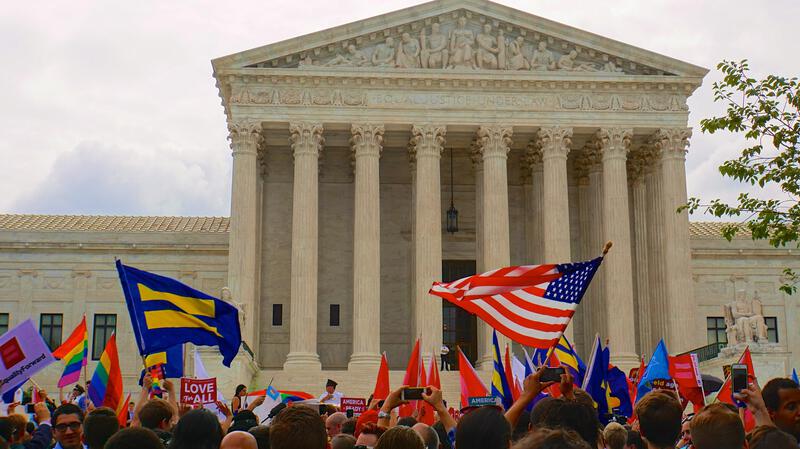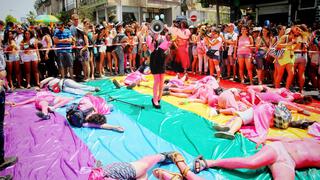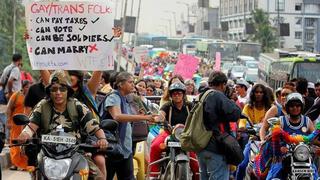Struggle for LGBT freedom and acceptance: A worldwide perspective
Published on

Almost two months ago, on 26 th June, United States of America became the 21st country in the world to legalize same-sex marriage nationwide. It was also the 5th country following Finland, Slovenia, The Republic of Ireland and Mexico, in year 2015 that has legalized same-sex marriages1 , 2. This was followed by a worldwide jubilation (primarily online), where the general public and an array of multinational companies and NGOs added a rainbow filter to their profile pictures and company logos3. Within the Indian online LGBT fora it raked up, once again, the discussion and campaign against section 377 of the Indian Penal Code (IPC) which criminalizes ‘unnatural sex’ - and was upheld as constitutional by the Supreme Court of India in December 2013.
Much of this dominant online discourse failed to capture the lives of marginalized people in the worldwide LGBT community who have repeatedly called for centering LGBT discourse onto issues that most affect them and the working class majority in every country such as - homo/trans - phobic hate crimes and atrocities, homelessness, discrimination in housing and employment, lack of access to health care and the resultant insecurity.
Transphobia & Homophobia around the world

Figure 2: 2013 Pride Parade in Tel Aviv, Israel: An anarcho-queer collective Mashpritzot held a die-in to protest Israeli pinkwashing, and the homo-normative priorities of the city-sposored LGBT center.
While the foreground of Facebook is flashing with profile pictures with rainbow filter, it demands a close scrutiny at the `discriminatory laws and practices and acts of violence against individuals based on their sexual orientation and gender identity’ as titled in a 2011 United Nations annual report on human rights. Several nation states perpetrate transphobic or homophobic crimes, or do not implement measures to prevent hate crimes, or fail to recognize transgender and queer people as equal4 , 5 to cisgender and heterosexual citizens6. Issuing a report on the status of human rights of LGBT people for the first time, the UN documented the violence and discriminatory laws/actions against LGBT individuals for two decades7. The UN report also draws from the reports of the International Gay and Lesbian Association (ILGA)8.
However, it should be noted that the tone and focus of the LGBT issues raised by international bodies such as the ILGA are politically problematic to the LGBT community and to the society at large, in two ways:
- ILGA provides data only on violence on gays and lesbians (homosexual or same - sex desiring people), and ignores the much higher prevalence of violence faced by transgender people. It is important for readers to understand the difference between homosexuals and bisexuals (whose identity is based on sexual orientation) and transgender people (whose identity is based on gender and not sexuality).
- Many International agencies including ILGA are additionally problematic in that they are active in implementing a US imperialist agenda called ‘pinkwashing’ - one that paints the US and its allies (such as the EU or Israel) as ‘pinkhavens’ that provide legal rights to LGBT people, while simultaneously claiming that the countries or people who oppose imperialism are wildly homophobic / transphobic. In addition, this agenda completely ignores the countries that oppose US imperialism and whose record on LGBT rights far surpasses that of the US. Examples of such countries include Cuba and Iran, which provide free and full medical support to transgender citizens9 , 10.
This posturing by US as an LGBT safe haven ignores the well-documented history of violence and murders of transgender individuals in the US, who are mostly of African - American and Latin - American ethnicities - as well as its history of incarcerating transgender survivors of violence who have defended attacks upon their lives. This fact is constantly pushed under the carpet by a largely gay, white male-centric discourse that prioritizes11 , 12 gay marriage over the day-to-day survival of trans people.
It is encouraging to see nations across the globe constantly reshaping their views towards LGBT individuals with many countries having shelved their sodomy laws13 , 14 imposed by the British during colonialism. However, other states like Russia have hiked up their state endorsement of homophobia by enacting a law that bans ‘gay propaganda’15 , 16.
Just as British colonialism was the force that created homophobic laws in the past, US imperialism plays a role in creating state sponsored homophobia by funding armed interventions in other nations and installing criminal gangs as its puppet governments in power. The most striking example is the Central American nation Honduras. Ever since US orchestrated a coup to oust Manuel Zelaya from power in 2009, the nation has seen the highest rate of state sponsored murders of trans people in the world17.
India’s position

Figure 3: Bangalore Pride and Karnataka Queer Habba 2014, organised by 'Campaign For Sexual Minorities Rights'
In India, long before funded NGOs and elite individuals staked a claim to have created an LGBT movement, hijras created a support network across the country accessible to working class Indians, even at the village level. For those who aren’t familiar with the term, Hijras are a subset of Indian transgender women who formally join a system of joint living and mutual care. They are the true trailblazers of the Indian LGBT movement. The working class gay men who identify themselves as ‘kothi’ often access the hijra community system for support and social space.
Legally speaking, Section 377 which criminalizes any ‘unnatural sex’ is just the tip of the iceberg when it comes to the state repression of queer and transgender people in India18. The term ‘unnatural sex’ can be construed by some to mean homosexual sex alone, but it is equally possible to apply it to heterosexuals performing any non-procreative sexual activity19. In practice however, Sec. 377 has mostly been used to repress and extort money from working class kothis and hijras who do not have private spaces or online platforms to meet potential partners or clients20.
Unfortunately, state violence upon kothis and hijras does not rely solely on the existence of this law but rather upon the impunity of the police as well. As with all minority communities - Adivasis, Dalits and Muslims, the state routinely violates the human rights and tortures hijras and kothis21 custodially, after criminalizing them through false cases under other sections of the IPC.
State repression therefore operates somewhat independently of the law, and even independently of some judgments such as the NALSA vs Union of India. In its judgment in this case, the Supreme Court recognized the rights of transgender people and provided guidelines for the Indian government to treat transgender and hijra people with dignity. But these guidelines have not been implemented in ways that combat the state of violence and constant extra - legal persecution they face on a daily basis22 , 23.
Clearly there is a long way to go in establishing rights and dignity for LGBT people in the world. It is only human to address the issues of sexuality and gender identity on a high priority basis and begin by providing a basic support system to the LGBT populace.